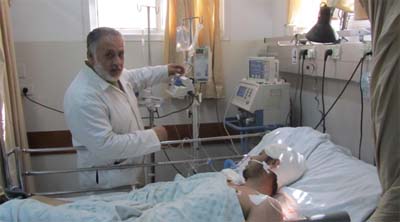Occupied Lives: Switching Off Hospitals
By Palestinian Centre for Human Rights
15 March, 2012
Pchrgaza.org

Dr. Kamal Abu Obada, Deputy Director of the Intensive Care Unit at al-Shifa hospital attends to one of his patients
The reality generated by Israel's longstanding illegal closure, the international sanctions against Gaza’s authorities, and political in-fighting between the Ministries in Gaza and Ramallah, has resulted in a fuel and electricity crisis in the Gaza Strip. Consequently, water and sanitation installations, hospitals, and other healthcare facilities are facing severe difficulties in providing basic services to the people of Gaza, undermining the right to health and the right to life. Such problems have been a consistent feature of life in the Gaza Strip since the current closure was imposed in 2007.
In January 2011, due to an unreliable supply and high costs, the authorities in the Gaza Strip stopped importing industrial fuel from Israel. Since then the Gaza Strip has relied on inherently unreliable smuggled fuel from Eypt. On 14 February 2012, a few days after the fuel supply from Egypt through tunnels into the Gaza Strip was stopped, Gaza’s only power plant was forced to shut down, leaving large parts of the Gaza Strip with only 6 hours of electricity daily. These electricity shortages needlessly endanger patients’ lives and well-being. During times of intensified violence, like the past 5 days, hospitals struggle to cope with the influx of wounded people. In the most recent Israeli attacks against the Gaza Strip 24 Palestinians were killed and 70 were wounded, most of them civilians.
The Director of Engineering and Maintenance in Gaza’s al-Shifa Hospital, Eng. Bassam Ali al-Hamadeen, deals with the consequences of the fuel and electricity crisis every day. “The patients most at risk are those in the intensive care unit, the babies in the nurseries, kidney dialysis patients and those in need of surgery. Thank God, no patients have died until now. However, we face other types of losses due to the electricity crisis. In the past two weeks generators of 6 basic health clinics across the Gaza Strip broke. They are simply not built to operate for the amount of time we need them. Generators are made for brief emergencies, of a few hours, only. Besides that, our generators and other machines are damaged and broken by the power being cut and returning constantly. Also, the fluctuation in power levels is harmful to our equipment. Now we lack the spare parts and oils to maintain the machines.”
Kamal Abu Obada, the Deputy Director of the Intensive Care Unit at al-Shifa hospital, is constantly aware of the risks that the patients he cares for are facing. “For me as a doctor this is all very depressing. All the time I’m working to keep the patients alive and when the electricity is cut they are all at risk. If something happens to them my efforts were all in vain.”
During periods of critical shortage of fuel and electricity the Ministry of Health declares a state of emergency, like they did in February. During these periods, all surgery is suspended, except for emergency operations. The air-conditioning is cut (cooling and heating), and the water purification and laundry services are limited, with evident hygiene and sanitation implications. Abu Obada explains: “During the state of emergency everything stops. We are not able to send our patients for surgery, unless it is absolutely necessary. We have to suspend other forms of treatment as well as tests and diagnostics.”
He continues: “The moment the electricity is cut, we rush to the patients and provide them with oxygen manually using oxygen bags. But we face two problems in doing this. Firstly, we simply don’t have enough manpower to attend to all the patients during the cuts. Also, it is difficult to control the quantity of oxygen manually, risking ruptures in the lungs when squeezing too much air out of the bag into the patient’s lungs. When the power comes back we have to reprogram all the machines again.”
Abu Obada is also confronted with material damages as a result of the power cuts; “When there is a power cut the heart and blood pressure monitors switch off. The internal sensors inside our machines are broken by the cuts which causes the alarms to go off unnecessarily and then for them to fail to kick in when something is wrong with the patient.”
Patients too, feel the threat of the electricity crisis: “Some of our patients are awake and are aware of the power cuts when they occur. These patients can hear us in those moments and fear for their own lives and those of the other patients,” says Abu Obada.
Due to a recent spate of abusive, racist and xenophobic comments we are forced to revise our comment policy and has put all comments on moderation que.


